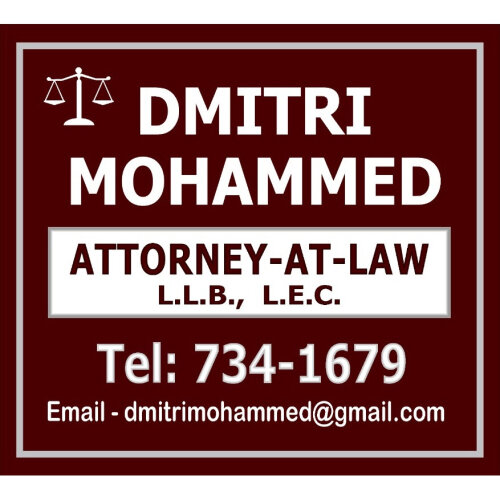Best Inheritance Law Lawyers in Trinidad and Tobago
Share your needs with us, get contacted by law firms.
Free. Takes 2 min.
Or refine your search by selecting a city:
List of the best lawyers in Trinidad and Tobago
About Inheritance Law in Trinidad and Tobago
Inheritance law in Trinidad and Tobago governs how a person’s assets are distributed after death. It covers both testamentary provisions in wills and rules of intestacy when a person dies without a valid will. The key statutory frameworks are the Wills Act, the Intestate Succession Act, and the Probate and Letters of Administration Act. The High Court Probate Registry issues probate to executors and letters of administration to administrators.
A will allows a person to appoint executors, identify beneficiaries, and set up guardianships or trusts for minor children. If there is no will, the estate passes under intestacy rules that specify shares for surviving spouses, children, and other relatives. Estate administration can involve debts, taxes, and possible claims by dependants. Real property, overseas assets, and family land can complicate distribution and require careful legal work.
In Trinidad and Tobago, practitioners include solicitors who draft and execute wills, and trial lawyers or barristers who appear in court for probate disputes. The system relies on formal requirements for valid wills and clear court procedures for administering estates. For anyone facing inheritance matters, early legal advice helps prevent delays and disputes.
Sources: Parliament of Trinidad and Tobago acts portal and TT Judiciary probate information provide the statutory framework and procedures for probate and succession matters. See the official sources for the most current rules and forms.
Why You May Need a Lawyer
- Drafting or updating a will after major life events - You recently married, had a child, or acquired significant assets and want to ensure your wishes are clear. A solicitor can draft a valid will that reflects your current assets and guardianship plans. This minimizes future disputes and speeds up probate if you die later.
- Probating a will or applying for letters of administration - When someone dies, the executor or administrator must apply to the High Court Probate Registry. A lawyer guides you through forms, affidavits, and asset valuation to obtain probate or letters of administration efficiently.
- Handling complex estates with property and foreign assets - If the decedent owned land in Trinidad and assets abroad, you need careful coordination of local and overseas probate procedures. An attorney coordinates asset identification, debts, taxes, and cross border issues.
- Disputes over validity or disputes among beneficiaries - Claims of lack of testamentary capacity, undue influence, or misrepresentation require prompt legal analysis. A solicitor can evaluate challenges and represent you in court if needed.
- Guardianship and trust provisions for minors - A will may appoint guardians or establish trusts. A lawyer helps set up the appropriate provisions and ensures the guardianship plan is legally sound.
- Co ownership and land survivorship issues - When property is co owned, distribution rules can be complex. A lawyer helps determine who inherits what and secures clear title transfers.
Local Laws Overview
The Wills Act
The Wills Act governs the valid execution of wills, including capacity, testamentary intent, and formal requirements such as attestation and witnesses. It sets the framework for how a will can direct the distribution of assets. This act is central to planning a person’s final wishes and avoiding disputes after death.
The Intestate Succession Act
The Intestate Succession Act provides the rules for distributing a deceased person’s estate when there is no valid will. It outlines the shares for a surviving spouse, children, and other relatives. This statute shapes how estates are distributed if someone dies intestate.
The Probate and Letters of Administration Act
The Probate and Letters of Administration Act covers the process of obtaining probate for a valid will and letters of administration when there is no will. It specifies who may apply, what evidence is needed, and how estates are administered by executors or administrators in the High Court.
Recent trends in inheritance law emphasize clarity in will execution, timely probate processing, and structured handling of complex estates, including property and overseas assets. For the latest amendments and effective dates, consult the official TT Parliament Acts portal and the Gazette.
Sources: Official TT Parliament Acts portal and TT Judiciary probate information provide authoritative guidance on these statutes. https://www.ttparliament.org/acts/ https://www.ttlawcourts.org/
Frequently Asked Questions
What is the difference between a will and intestacy in Trinidad and Tobago?
A will appoints beneficiaries and an executor to carry out your wishes. Intestacy occurs when there is no valid will, and the estate is distributed under statutory rules.
How do I start probate in Trinidad and Tobago?
You begin by locating the will and death certificate, valuing assets and debts, and filing a probate application with the High Court. A lawyer guides you through forms and evidence.
What documents are needed to apply for probate?
You will need the death certificate, the original will, asset valuations, and details of liabilities. Identification and proof of executor status are also required.
How long does probate typically take in Trinidad and Tobago?
probate duration varies with estate complexity and court schedules. Simple estates may take several months, while large or contested estates can take over a year.
Do I need to hire a solicitor to draft a will in Trinidad and Tobago?
No, you can draft a will yourself. However, a solicitor ensures legal validity, clear asset descriptions, and proper witnessing to avoid challenges.
How much does probate cost in Trinidad and Tobago?
Costs depend on estate size, complexity, and counsel rates. Typical expenses include filing fees, attorney fees, and executor or administrator allowances.
Who can apply for letters of administration in Trinidad and Tobago?
Typically the surviving spouse or other close relatives may apply, provided they have an interest in the estate. A lawyer helps determine eligibility.
Can a will be challenged in Trinidad and Tobago?
Yes, a will can be challenged on grounds such as lack of capacity, undue influence, coercion, or fraud. A lawyer evaluates grounds and represents you.
What is the role of an executor or administrator in Trinidad and Tobago probate?
The executor manages asset collection, debt payment, and distribution according to the will. The administrator handles intestate distributions and court filings.
Is there a dependants' relief provision in TT intestacy?
There are statutory and common law considerations for dependants, but the specifics require careful review by a solicitor. Dependants may have claims depending on circumstances.
How are land and real property distributed if owned jointly in TT?
Joint ownership affects survivorship and transfer. A lawyer helps determine the correct form of title transfer and distribution to heirs.
Do I need a will if I own assets abroad?
Having a will for TT assets is advisable, and planning for foreign assets may require separate wills or international probate steps. Consult a solicitor for cross border planning.
Additional Resources
- Parliament of Trinidad and Tobago - Acts Portal - Official repository for all enacted laws, including Wills, Intestate Succession, and Probate statutes. https://www.ttparliament.org/acts/
- The Judiciary of Trinidad and Tobago - Probate Registry information, forms, and court procedures related to wills and administration. https://www.ttlawcourts.org/
- Attorney General's Chambers - Succession and Probate Guidance - Government guidance on legal processes for wills, estates, and probate. https://www.gov.tt/ag/
Next Steps
- Clarify your goal - Determine whether you need to draft or update a will, or resolve intestate succession. This helps tailor your plan. Plan should include asset types and potential heirs.
- Gather key documents - Collect death certificates, existing wills, asset lists, title deeds, and debt statements. Having documents ready speeds up the process.
- Identify a TT solicitor or attorney - Seek a lawyer who specializes in wills and probate. Ask about experience with land, trusts, and cross border assets.
- Schedule an initial consultation - Discuss your goals, timeline, and estimated costs. Get a written outline of the proposed approach and fees.
- Decide on the probate path - If there is a will, plan for probate; if not, prepare for letters of administration. Your lawyer will file the necessary petitions with the Probate Registry.
- Proceed with filing and follow up - File all required forms, gather affidavits, and respond to court requests promptly to avoid delays. Expect several months in simple cases, longer for complex estates.
Lawzana helps you find the best lawyers and law firms in Trinidad and Tobago through a curated and pre-screened list of qualified legal professionals. Our platform offers rankings and detailed profiles of attorneys and law firms, allowing you to compare based on practice areas, including Inheritance Law, experience, and client feedback.
Each profile includes a description of the firm's areas of practice, client reviews, team members and partners, year of establishment, spoken languages, office locations, contact information, social media presence, and any published articles or resources. Most firms on our platform speak English and are experienced in both local and international legal matters.
Get a quote from top-rated law firms in Trinidad and Tobago — quickly, securely, and without unnecessary hassle.
Disclaimer:
The information provided on this page is for general informational purposes only and does not constitute legal advice. While we strive to ensure the accuracy and relevance of the content, legal information may change over time, and interpretations of the law can vary. You should always consult with a qualified legal professional for advice specific to your situation.
We disclaim all liability for actions taken or not taken based on the content of this page. If you believe any information is incorrect or outdated, please contact us, and we will review and update it where appropriate.
Browse inheritance law law firms by city in Trinidad and Tobago
Refine your search by selecting a city.















